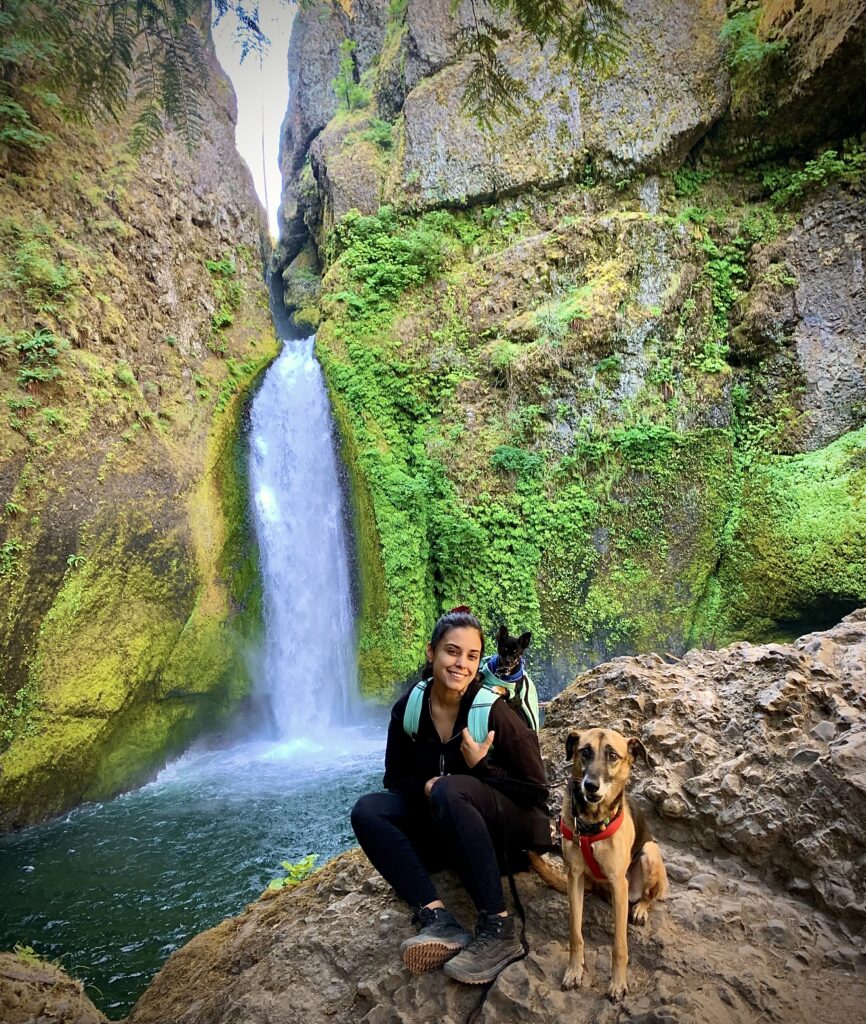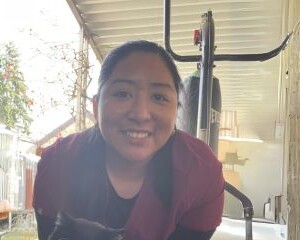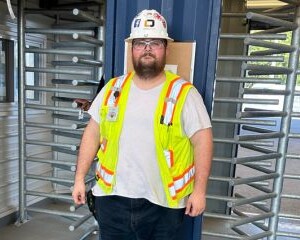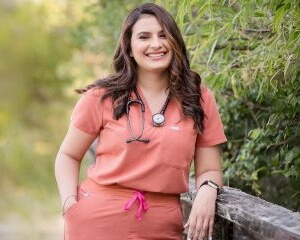Faculty Q&A with Veterinary Assisting Instructor Marina Texel
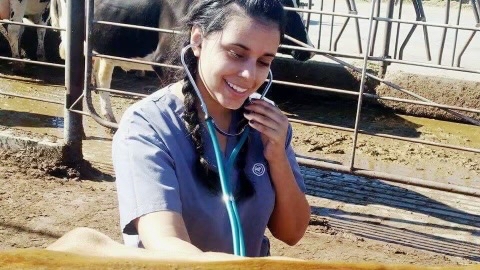 Marina Texel grew up in Southern California and always dreamed of working with animals as an adult. She found her way through Carrington College’s Veterinary Technology program in Pomona. After graduating and spending years working in a variety of veterinary hospitals, she is now achieving her ultimate dream of returning to the classroom as an instructor helping students realize their dreams. Today, she teaches Veterinary Assisting at Carrington’s Portland, Oregon campus.
Marina Texel grew up in Southern California and always dreamed of working with animals as an adult. She found her way through Carrington College’s Veterinary Technology program in Pomona. After graduating and spending years working in a variety of veterinary hospitals, she is now achieving her ultimate dream of returning to the classroom as an instructor helping students realize their dreams. Today, she teaches Veterinary Assisting at Carrington’s Portland, Oregon campus.
Please tell us a little bit about yourself.
I was born and raised in Palm Springs, California, and have always loved animals. I had zillions of stuffed animals all around my room. My mom would buy me encyclopedias and books on animals because I was always interested in reading about them. They could be books on breeds of cats or books on breeds of dogs–anything like that–and I would sit there absorbed by reading them.
When I was going through high school, I knew I wanted to do something related to animals. I just needed to research and figure out what career options existed. I went online and looked up veterinary jobs. One of the first things that popped up was Carrington College in Pomona.
I talked to my parents about it because the school was about two hours away. I needed to figure out my options for housing and transportation if I was going to go there. My parents were very supportive and they pushed me to start this journey. They always encouraged me to do something that I love. They didn’t want me to do something that I would be unhappy doing. I feel thankful now that I had that kind of support. I realize now that there were certain obstacles I didn’t have in front of me because they were so supportive.
When did you enter the field of veterinary technology?
I graduated from high school in 2013 and started the Veterinary Technology program at Carrington College Pomona in 2014. The program was (in as few as) twenty-two months long, so almost two years. I graduated in 2016. Right after I graduated, I started working at a veterinary hospital. When I was growing up and going to high school and college, I never worked, I was always focused strictly on school, so that was my first job. I felt ready to start at a hospital when I finished the program.
Did that hospital have a specific focus?
Yes, it was an emergency hospital and I started by doing overnight shifts. It was mostly cats, dogs, and small animals like birds and rabbits. While there, I was still looking to see what type of hospital I would be the happiest.
While looking, I found a job at a mobile veterinary hospital. I had no idea what a mobile veterinary hospital was until I went to my interview. It was an RV with a surgery suite, x-ray machine, blood machine, and wet table for dental procedures. The doctor would drive around the Coachella Valley to our clients’ houses and park in their driveways. Our clients could bring their animals out to the RV and they wouldn’t have to drive them to the hospital. I stuck with that vet for about two-and-a-half years when I was in my formative, still able to be molded, vet tech phase.
That vet was my mentor and taught me a lot when I worked with her. She gave me a lot of confidence. It was an awesome experience.
Did the mobile vet allow you to help clients who might not otherwise be seen?
Yes, we would even go to the senior communities and see their pets if they needed their pets to be seen. Sometimes we would even go inside the house to see the pets if they were older and had trouble going up a couple of steps to get into the RV.
The vet would adjust to every client and patient as needed. That taught me a lot because not every patient or client is the same. I learned a lot through all of these different experiences. Sadly, my boss, the doctor, passed away unexpectedly at the end of those two and a half years and it was her business, so it did close.
Where did you go after the mobile vet passed away?
I found myself at the Palm Springs Animal Hospital in 2018. I stayed there for about two years and mostly saw dogs and cats. I wanted to branch out and see different types of animals and had an opportunity to do that at VCA All Creatures in 2020. I saw a variety of animals there like chameleons, ferrets, 150-pound tortoises, baby goats, piglets–you name it. The doctor there reminded me of the doctor who I worked with at the mobile veterinary hospital. He even knew her, so we had that in common, which made me very comfortable with him. He was also a great person to learn from, as well.
I was able to learn how to take care of these pets and how to treat them when they are sick. It was such an awesome experience there, as well. Thankfully, it wasn’t all new to me. There was a lot that I had already learned about in Carrington College’s Veterinary Technology program. So, ultimately I was prepared, but the experience was something that I needed to go through myself.
I eventually transferred to a VCA in Portland in July of 2021 with my fiancé. That December, I took my VTNE (Veterinary Technician National Exam) here in Oregon and passed, so I got my vet tech license in Oregon.
When did you start teaching at Carrington?
I started teaching at Carrington in September 2022. I have had my license since last December and that started to open up new opportunities for me. I knew from the beginning that I didn’t want to stay in a hospital working as a technician. My goal from the beginning–based on my experiences at Carrington–made me want to teach.
What was it about teaching that appealed to you?
The people who taught me at Carrington were always there to make sure we felt confident in what we were doing. I like to give that confidence to other people. I took that experience with me to the hospital after graduating. If someone new came into the hospital, I wanted to make sure they felt comfortable with what they were doing. I would always help new people and show them the way and make sure they felt comfortable because my instructors always made me feel confident with the way they were teaching us.
Do you have a favorite subject that you teach?
I think my favorite subject to teach is venipuncture–blood draws. Just this week, I had a student stay after class for extra tutoring and practice. She asked me if she could work on her blood draws before she goes into her clinical externship. I have two dogs and one of them was there to use for practice. Luckily, he is so patient and good. My student was able to successfully draw blood from him. It was so great just to see that connection and excitement from her when she did it. That is one of my favorite parts of teaching.
Do you learn from your students?
I feel like I learn a lot from them. Some of them have a lot of knowledge. One student has a sugar glider that she brings in and knows all about them. She taught me how to clip their nails!
What do you want students to know about you?
I want them to know that I have been in their place and I understand what it feels like to be that first-term student, maybe not knowing what terminology means, and just feeling overwhelmed or even struggling. Now I am helping them and guiding them through that process. I am helping them be organized. I am letting them know, you’ve got this! I have confidence in you.
What do you think Carrington College provides Veterinary Assisting students that they wouldn’t find elsewhere?
They learn the reason behind why we do things a certain way. So, they are gaining an understanding of why we use certain blood tubes. They are getting the knowledge of why we use certain anesthetic agents and what to look out for when patients are under anesthesia. They are learning how to troubleshoot things that might happen in the field. That way they have the confidence that they need when they eventually run into different scenarios.
Does your program provide support and encouragement for students who might need accommodations or assistance?
Yes, and I’m working with students right now who need that. Beyond helping just students in this program, the school helps students in all the different programs who might be struggling with housing, food, or other needs. If students don’t have a lot of community support behind them, Carrington does a great job of filling in and providing that support. The school has a lot of resources that they offer students who have obstacles in front of them.
What do you enjoy most about your work?
I think that the hands-on part of teaching is probably my favorite part. So, teaching them how to perform CPR, do surgical scrubbing, use microscopes, venipuncture–things like that.
How did Carrington College prepare you for your career?
Carrington prepared me by going through every subject, making sure we knew what was most important, and what we were going to apply in the hospital. I feel the school gave us the clinical experience we needed. They had a lab once a week that allowed us to bring in and practice on our pets. They also had a surgical suite where we would practice doing surgery with the veterinarian that we had on staff there. The program prepared us for working in a clinic.
Do you have any advice for people interested in going into your field?
If I had any advice, I would say, find the program that is going to best suit you and go into the program with your whole heart.
Is there anything that you would like to add?
I am thankful for all of the experiences that I have been through that have gotten me to this point. This was my ultimate career goal and I have never been happier than I am now.
